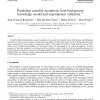Free Online Productivity Tools
i2Speak
i2Symbol
i2OCR
iTex2Img
iWeb2Print
iWeb2Shot
i2Type
iPdf2Split
iPdf2Merge
i2Bopomofo
i2Arabic
i2Style
i2Image
i2PDF
iLatex2Rtf
Sci2ools
137
click to vote
IJAR
2008
2008
Predicting causality ascriptions from background knowledge: model and experimental validation
A model is defined that predicts an agent's ascriptions of causality (and related notions of facilitation and justification) between two events in a chain, based on background knowledge about the normal course of the world. Background knowledge is represented by non-monotonic consequence relations. This enables the model to handle situations of poor information, where background knowledge is not accurate enough to be represented in, e.g., structural equations. Tentative properties of causality ascriptions are discussed, and the conditions under which they hold are identified (preference for abnormal factors, transitivity, coherence with logical entailment, and stability with respect to disjunction and conjunction). Empirical data are reported to support the psychological plausibility of our basic definitions.
Related Content
| Added | 12 Dec 2010 |
| Updated | 12 Dec 2010 |
| Type | Journal |
| Year | 2008 |
| Where | IJAR |
| Authors | Jean-François Bonnefon, Rui Da Silva Neves, Didier Dubois, Henri Prade |
Comments (0)

